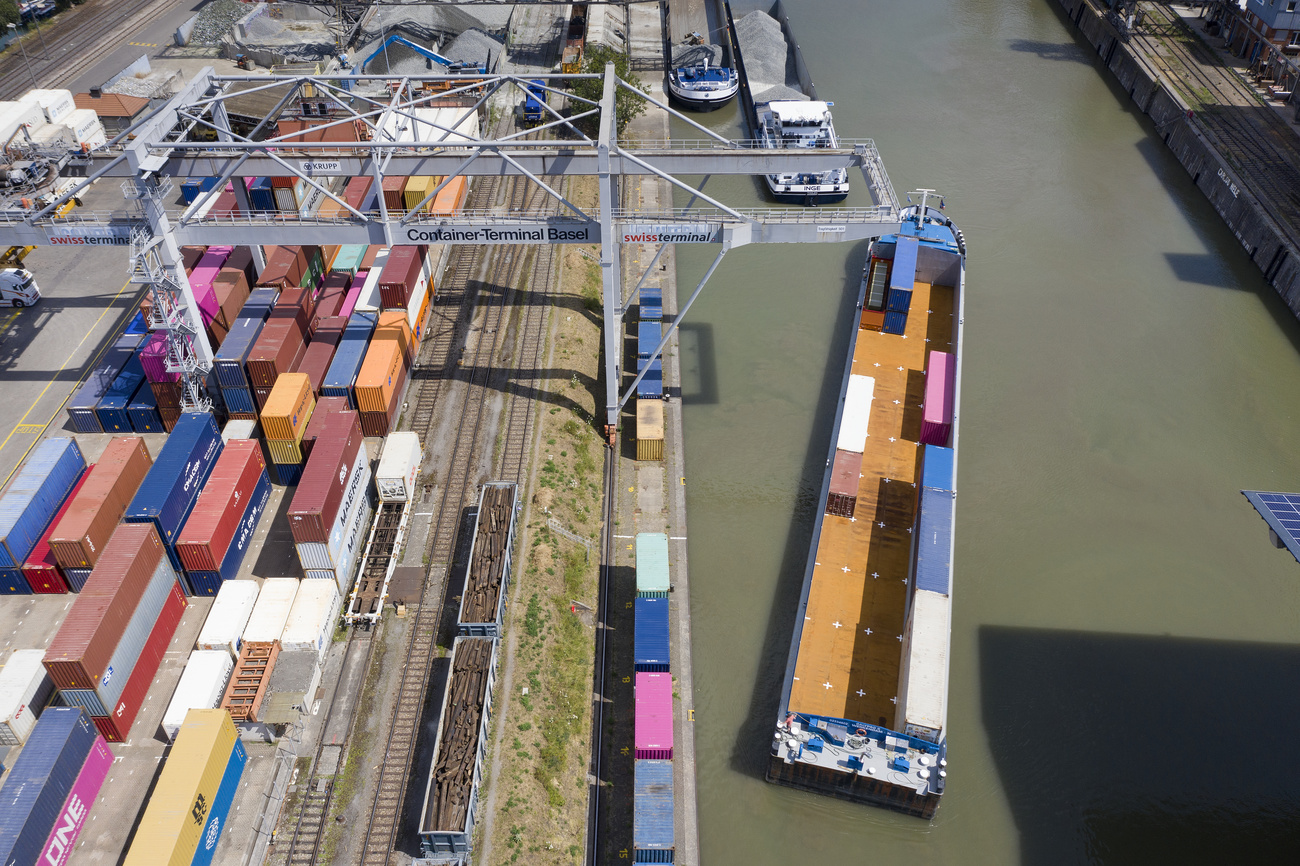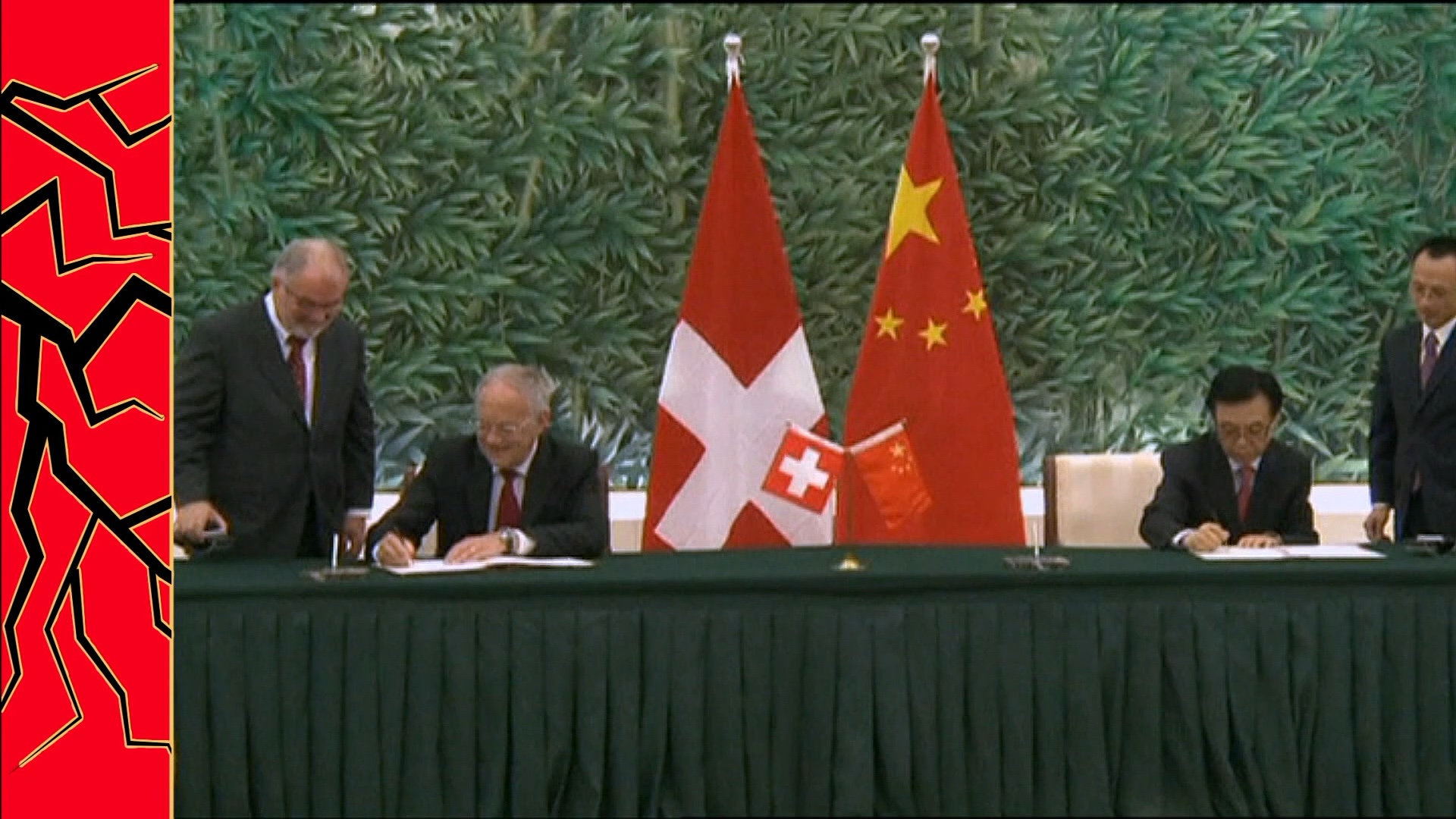Switzerland wants more trade with China despite US-Chinese tensions

The West is turning its back on China. Switzerland is doing the opposite and is deepening its economic ties with the Asian giant – but with what consequences?
The West has adopted a harsh stance towards China. The European Union has imposed punitive tariffs on Chinese electric vehicles and the United States is ready to start a trade war with China. Many Western trade partners are trying to expand their delivery chains and forge new alliances. This approach, known as de-risking, is intended to dismantle critical dependencies.
For many countries, the times when profit dictated their relationship with China are over – with one exception. Switzerland is seeking to intensify its economic relations with the Asian power. In September, the Swiss government gave the green light for negotiations to go ahead on expanding its free trade agreement (FTA) with China.
Switzerland has always had a particularly friendly relationship with China. It was one of the first Western countries to recognise the People’s Republic of China under the rule of Mao Zedong in 1950. The two countries will soon celebrate the 75th anniversary of this relationship.
Switzerland ‘in a good negotiating position’ with China
However, things are not nearly as rosy as they were ten years ago, when the FTA first came into force. The Chinese economy is weakening. Switzerland’s most important trading partners, the EU and the US, are turning their backs on China. Nationalistic rhetoric is threatening to escalate the conflict with Taiwan. Is Switzerland being naïve?
Not necessarily, says Wan-Hsin Liu, an expert in international negotiations and investments at the Kiel Institute for the World Economy. “After ten years, it makes sense for Switzerland to update the current agreement,” she says.
Liu explains that, “particularly against the backdrop of the current geopolitical tensions, it is conceivable that China might withdraw certain liberalisation measures at some point. Switzerland could be better protected against this with an agreement.”
In addition, she says, an update of the FTA would be an opportunity to demand updating certain rules of the game, such as in the areas of commerce and data protection for international data transfer.

More
Who benefits from free trade agreements with Switzerland?
As for human rights, Liu sees Switzerland as being in a good negotiating position. “The agreement is particularly important for China right now because it gives it access to the European market,” she says. At a time when the US has turned away from China and the EU is seeking to distance itself, this has great significance for China. Liu is convinced that “China will do everything to not lose this access.”
In turn, the Swiss government could utilise this dependency to call for greater human rights and environmental protection. However, a Swiss House of Representatives committee has so far rejected binding rules on these issues in the agreement. As a result, numerous organisations and left-leaning parties have announced a referendum to increase pressure.
Major dependencies among Swiss companies
On the other hand, due to its size alone, China is an essential market for a small export-oriented country like Switzerland. It is also the Alpine nation’s third-most important trading partner. According to the State Secretariat for Economic Affairs (SECO), Swiss companies exported goods worth CHF40.6 billion ($46.8 billion) to China in 2023. Imports totalled CHF18.4 billion ($21.2 billion). Growth in trade volumes has slowed compared to a few years ago. Gold is a predominant export good, but it is excluded from the trade agreement.
Our analysis of the Swiss-Chinese trade relationship can be found here:

More
Why Switzerland seeks deeper ties with China
Nonetheless, “decoupling from China would be unsustainable for the economy at the moment,” says Daniel Kinderman, a professor of political science at the University of Delaware. It would be better for Switzerland to diversify its key markets. This became evident during the Covid-19 pandemic. China’s weakened economic growth is now putting more pressure on Swiss companies to broaden their options.
A surveyExternal link conducted in 2023 by the KOF Swiss Economic Institute at the federal technology institute ETH Zurich, shows that a fifth of Swiss industrial companies are moderately to heavily dependent on critical inputs from China. The electronics sector is the most dependent, followed by the pharmaceutical and chemical industries. Just under a fifth of companies are unable to assess their own dependency. Overall, more than half of the companies surveyed have not taken any measures and just under a third of companies have taken or are planning to take up to three measures, such as sourcing more from Europe.
In the US, Switzerland’s unique approach is seen as pragmatic. “The Swiss government is obviously of the opinion that a ‘business-as-usual’ approach is still a viable option,” says Kinderman. “How long this strategy will continue to work is unclear.” A decisive factor will also be who wins the presidential election in the US next week. “If Trump wins again, he will probably pursue a very tough anti-China course in terms of trade policy, and that could also affect Switzerland, among others,” he says.
The Swiss industrial sector is more concerned about this than politicians are. “The biggest concern for companies in certain industries is whether their business with Chinese customers could affect their US business,” writes Alain Graf, a senior consultant at Switzerland Global Enterprise in an articleExternal link in Bloomberg.
More
A legal caseExternal link last spring gave a foretaste of what this could mean. The Swiss company ABB supplies the Chinese state-owned company Shanghai Zhenhua Heavy Industries with software for harbour cranes. This software is installed in the cranes in China and then delivered to the US. The US feared that the software would collect data on the handling of goods via a back door and deliver it to the Chinese government. ABB was called to testify on the issue before the US Congress.
‘Switzerland has no Plan B’
“I think such cases will become more frequent in the future,” says Simona Grano, a senior lecturer in China studies at the University of Zurich. “As trade tensions increase, it will become increasingly difficult for Switzerland to do business with both sides.” Grano also believes there is a real risk that the US and the EU will restrict their trade relations with Switzerland if it continues to back China. “In the worst-case scenario, Switzerland would have to choose between the major powers.”
And if China attacks Taiwan? “The consequences for the global economy and Switzerland would be devastating,” says Grano. The fact that there are no discussions about this is problematic, she adds: “Switzerland currently has no plan B.” Instead, it is taking a cosying-up approach.
This became evident in the summer of 2024 when Swiss Foreign Minister Ignazio Cassis decided to refrain from updating his department’s China strategy. This public document provides federal stakeholders with guidance on how to deal with their respective counterparts and, says Grano, in the case of China, it should also have addressed the Taiwan issue, for example.
“What we need now is clear positioning,” says Grano. To do this, one must be prepared to annoy China from time to time. “The times when Switzerland was able to decouple its economy from political issues are slowly but surely over.”
Edited by Giannis Mavris. Adapted from German by Sue Brönnimann/gw

More
Our weekly newsletter on foreign affairs

In compliance with the JTI standards
More: SWI swissinfo.ch certified by the Journalism Trust Initiative












You can find an overview of ongoing debates with our journalists here . Please join us!
If you want to start a conversation about a topic raised in this article or want to report factual errors, email us at english@swissinfo.ch.